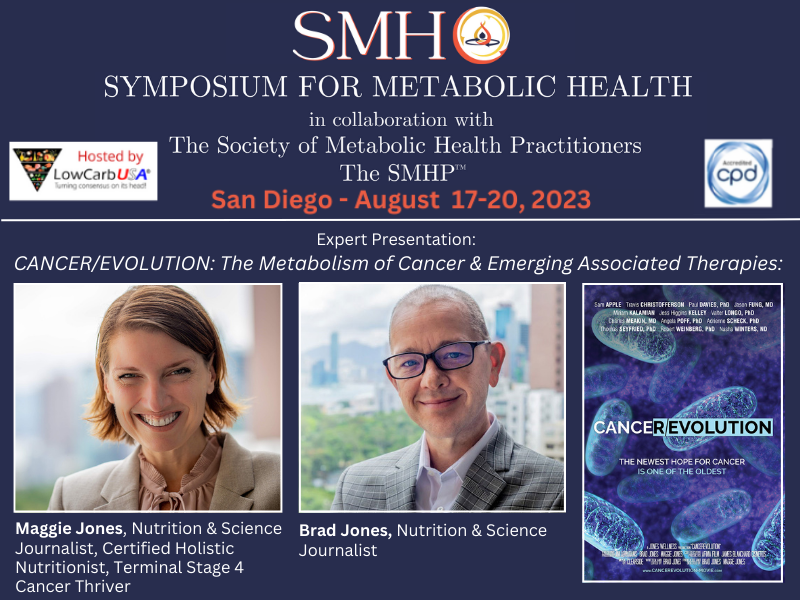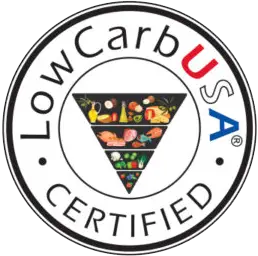Maggie and Brad Jones to present “The Metabolism of Cancer and Emerging Associated Therapies” at San Diego Symposium

Maggie and Brad Jones—producers and directors of the upcoming documentary series CANCER/EVOLUTION—will take the main stage at the Symposium for Metabolic Health in San Diego in August to deliver a presentation entitled “CANCER/EVOLUTION: The Metabolism of Cancer and Emerging Associated Therapies”.
The presentation is part of LowCarbUSA’s efforts to call attention to the connection between cancer and metabolic disease, and to educate practitioners and laypersons about metabolic therapies that may improve outcomes.
One month after Maggie’s 40th birthday, she was diagnosed with terminal, stage 4 lung cancer that had spread to her eye and liver, four tumors in her brain, and more than a dozen lymph nodes throughout her chest, neck and abdomen.
“My prognosis of six to eight months with conventional treatment seemed optimistic,” said Maggie. “My doctors were focused on making me comfortable. I was dying.”
“One year later I was cancer free,” she said, and now she’s on a mission, along with her husband, to share what they have learned as a result of the battle with her cancer.
“In that intervening year I devoted myself to studying the metabolic theory of cancer and researching the cutting-edge, evidence-based therapies that are just now being published,” said Maggie.
Over the past 5 years, Maggie and Brad have attended scientific conferences, met and interviewed leading doctors and scientists who are shifting the cancer paradigm, and they are preparing to release their documentary series later this year.
Topics Brad and Maggie plan to discuss in their presentation include:
- The Warburg Effect and the role of glucose and glutamine metabolism in carcinogenesis.
- Research and technology over the past century supporting the metabolic theory of cancer and the primacy of mitochondrial dysfunction in malignancy.
- Social, political, and scientific factors that have contributed to the metabolic theory falling out of favor.
- Comparisons between the metabolic theory of cancer and the somatic mutation theory of cancer.
- Emerging therapies based on cancer’s unique metabolism and their impact on patient survival, side effects of conventional treatment, and overall quality of life.
The underlying question that Maggie and Brad keep returning to is “What if our most basic, foundational assumption about what causes cancer is wrong?”
They discuss the now century-old work of Dr. Otto Warburg, and the “Warburg Effect”, which is the foundation for the metabolic theory of cancer and a new generation of effective cancer therapies – all of which can be used in conjunction with conventional therapy to dramatically improve outcomes.
The presentation will look into advances in research into the metabolism of cancer under Drs. Peter Pedersen (Johns Hopkins University College of Medicine), Thomas Seyfried (Boston College), Angela Poff (University of South Florida), Adrienne Scheck (University of Arizona College of Medicine), and others.
Maggie and Brad also take a critical look at current treatments based on the somatic mutation theory (SMT) that can cost patients more than $100,000 per treatment yet have been shown to extend lives by an average of only 2.4 months.
They also examine pilot trials of inexpensive, complementary metabolic therapies including water fasting, therapeutic ketogenic diet, and off-label medication completed in recent years that are “demonstrating inspiring results in increasing patient survival, reducing side effects of conventional treatment, and increasing overall quality of life.”
According to a 2011 study, it takes an average of 17 years for research evidence to become clinical treatment, longer for treatments without profit potential. The final message from Brad and Maggie: “Cancer patients don’t have time to wait.”
For more information about the Symposium for Metabolic Health in San Diego, August 17-20, 2023, visit the event page. Save on tickets, low-carb meals, and optional CME credits when you register using the code on the registration page.


